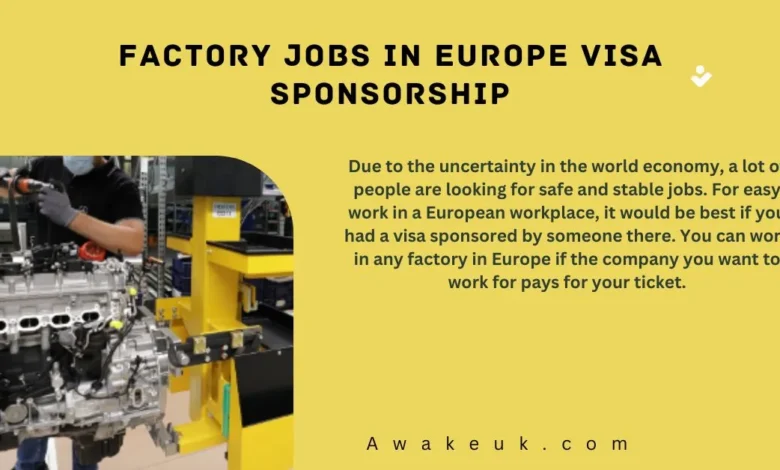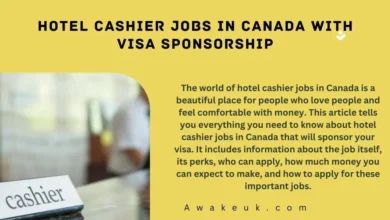Factory Jobs In Europe Visa Sponsorship

Due to the uncertainty in the world economy, a lot of people are looking for safe and stable jobs. For easy work in a European workplace, it would be best if you had a visa sponsored by someone there. You can work in any factory in Europe if the company you want to work for pays for your ticket.
A great way to get a job in Europe is to work in a factory. Given how quickly the global economy changes, people looking for work should stay up to date on what’s happening in their fields and places. If you keep reading, you’ll learn how to get a factory job in Europe that will pay for your visa.
A Factory Job Is What?
People who work in manufacturing often use tools and machines. They are great ways to get started on the path to a successful job. They offer safety and financial benefits, and they’re a great way to get started in the production industry. For entry-level jobs in European factories, a high school diploma or a foreign equivalent is often enough.
Details of Factory Jobs In Europe Visa Sponsorship
Benefits
- Legal Authorization: When European factories support workers’ visas, they can legally live and work in Europe. This makes sure that immigration laws and rules are followed.
- Employment Stability: Factory jobs often offer stable work with set hours, which can help international workers feel safe and secure about their finances.
- Skill Development: Working in a factory can help foreign workers advance in their careers and find work by giving them useful skills and experience in manufacturing, production, logistics, and other related areas.
- Competitive Pay: Many factory jobs in Europe offer competitive pay and perks, such as health insurance, paid time off, and retirement plans, which help international workers maintain a good standard of living.
- Cultural Exchange: International workers in a European workplace can fully experience the local culture, language, and customs, which makes for a rich cultural exchange.
- Networking Chances: People who work in factories often have to work with coworkers from different backgrounds. This gives international workers the chance to meet new people and make business connections.
- Career Advancement: Some factories in Europe offer training programs, promotions, and access to higher-level jobs within the company that can help workers move up in their careers and improve their skills.
- Lifestyle: Many European countries have a high quality of life, with great healthcare, education, infrastructure, and social services. This makes life comfortable and satisfying for foreign workers and their families.
- Chances to Travel: Working in Europe gives foreign workers the chance to travel and experience new cultures, places, and things to do in their spare time.
Requirement
- Valid Passport: Applicants must have a passport from their home country that is still good and has at least six months left on it.
- Work Visa or Permit: To officially work in Europe, applicants may need to get a work visa or permit, depending on the country and the visa sponsorship program. Usually, you have to apply through the embassy or consulate of that country and provide the appropriate paperwork.
- Job Offer: If you want to work in Europe as an international worker, you need to have a job offer or employment contract from a company that will support your visa. The job offer should include the terms of the job, such as duties, length of work, pay, benefits, and any other information that is important.
- Qualifications and Skills: People looking for factory jobs should have the skills, qualifications, and experience needed for the job. This could include learning how to make things, manage supplies, run machines, check for quality issues, or do other related things.
- Language Skills: Depending on the country and the job standards, applicants may need to show that they can speak and write well in either the local language or a common language like English. There may be a need for language tests or qualifications.
- In some European countries, foreign workers are required to have health insurance while they are there. People who want to apply may need to show proof that they have health insurance that meets the country’s standards.
- Background Check: Applicants may have to go through a background check to see if they have a criminal record, a history of working, or other information that is relevant to the job.
- Financial Stability: Applicants may need to show that they are financially stable or that they have enough money to live on while they are in Europe, especially if they are not instantly eligible for public assistance.
- Compliance with Immigration Laws: International workers must follow all immigration laws and rules of the European country where they want to work. This includes any requirements for extending their visa, renewing their residence permit, or changing their job status.
Employment Opportunities in Europe’s Various Factories
Many people from outside of Europe can live and work in a new country while making enough money to live on thanks to factory jobs in Europe. Foreigners who work in companies in Europe should know about these four types of work:
Jobs in Agriculture:
There are agricultural processing companies all over Europe, and they hire people from all over the world as well as from Europe. In these places, different kinds of fruits, vegetables, dairy goods, and even meat are made. The work is often hard, but it pays well and has other benefits.
Production of Clothes:
The clothing business is one of Europe’s most active ones. Many companies need skilled workers to meet the needs of customers from all over the world who want to buy clothes. People who have worked with fabrics and sewing tools in a different country might be good at this factory job.
Producing Cars and Trucks:
Another business that is growing in Europe is the making of cars. There are a lot of job openings at automakers for people who can create, display, and check the quality of vehicles. This production setting is great for people who know a lot about cars.
Read Also: Truck Dispatcher Jobs in Romania for International
Qualification/Requirements
- You need a strong back, good eyesight, and a lot of patience to work in a plant.
- In Europe, working in a workplace usually means long shifts and a lot of trips. You should be ready to work late at night or on the weekend and meet tight goals. Get ready for a lot of noise, hard work, and tools that could be dangerous.
- In Europe, factory jobs aren’t usually entry-level jobs. In Europe, most factory jobs require a bachelor’s degree or experience that is comparable. People who want to work in factories usually need to be good at math and science and know how tools work. Some plant workers also need to know how to do certain things, like welding or building things out of wood.
How to Apply for a Job in a European Factory?
Conclusion:
International workers can find safe jobs in factories in Europe that pay well and offer chances to improve their skills. Foreign workers can officially live and work in Europe if they are sponsored for a visa. They can help with industries like farming, clothing production, and car manufacturing.
Frequently Asked Questions
-
What are the requirements for applying for a factory job in Europe?
A legal passport, a work visa or permit, a job offer from a sponsoring company, the right qualifications and skills, language skills, health insurance, a background check, being financially stable, and following immigration laws are some of the things that are needed.
-
What types of factory jobs are available in Europe?
In Europe, factory work can be found in many fields, such as farming, making clothes, making cars, and more. Some examples are jobs that involve handling crops, making clothes, and putting together cars.



